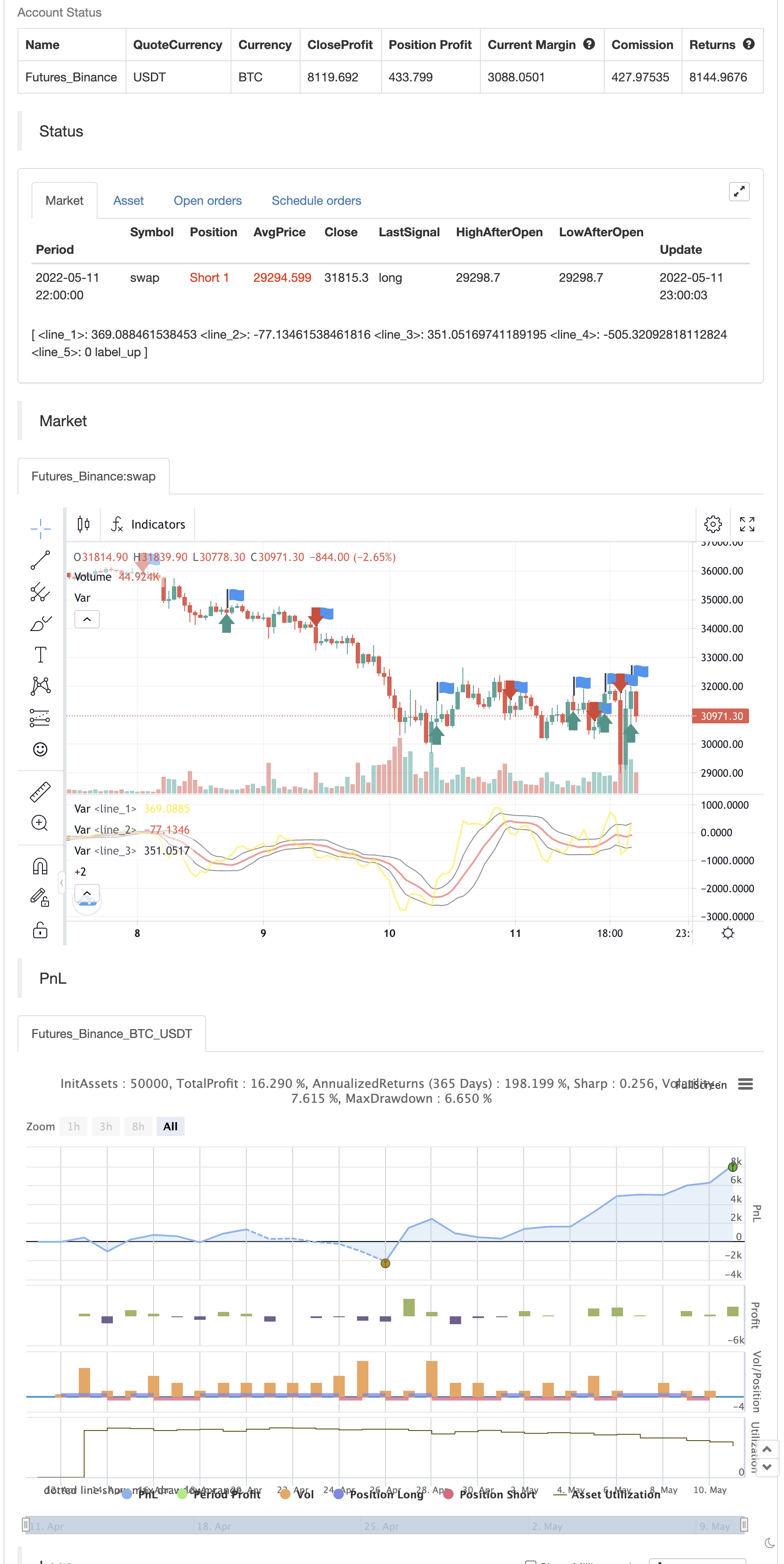Bandes de Mobo
Auteur:ChaoZhang est là., Date: le 13 mai 2022 à 14h27Les étiquettes:SMA
Cet indicateur est les bandes de Mobo (bandes de rupture de momentum). Ces bandes sont des bandes de Bollinger qui ont un écart type ajusté. Il y a des signaux d'achat lorsqu'il a des ruptures de momentum au-dessus des bandes pour les mouvements vers le haut et des signaux de vente lorsqu'il a des ruptures de momentum en dessous des bandes pour les mouvements vers le bas. Les bandes suggèrent simplement que tous les marchés ont des périodes dont nous savons tous qu'elles sont vraies. Alors que le prix est à l'intérieur des bandes, on dit qu'il est sans tendance. Une fois les ruptures survenues, vous pouvez effectuer des transactions dans le sens de la rupture.
test de retour

/*backtest
start: 2022-04-12 00:00:00
end: 2022-05-11 23:59:00
period: 1h
basePeriod: 15m
exchanges: [{"eid":"Futures_Binance","currency":"BTC_USDT"}]
*/
//@version=4
study("Mobo Bands", overlay=false)
price = input(hl2, "Price")
colorNormLength = input(3, "colorNormLength", input.integer)
dpoLength = input(13, "dpoLength", input.integer)
moboDisplace = input(0, "moboDisplace", input.integer)
moboLength = input(10, "moboLength", input.integer)
numDevDn = input(-0.8, "numDevDn", input.float)
numDevUp = input(0.8, "numDevUp", input.float)
coloredMobo = input(true, "coloredMobo")
coloredFill = input(true, "coloredFill")
breakArrows = input(true, "breakArrows")
moboShowMid = input(true, "moboShowMid")
//def DPO = price - Average(price[DPO_length / 2 + 1], DPO_length);
xsma = sma(price[int(dpoLength / 2 + 1)], dpoLength)
//alert(int(dpoLength / 2 + 1))
//xsma = sma(price, dpoLength)
DPO = price - xsma
Midline = sma(DPO, moboLength)
sDev = stdev(DPO, moboLength)
LowerBand = Midline + numDevDn * sDev
UpperBand = Midline + numDevUp * sDev
plot(DPO, color=color.yellow,linewidth=2)
plot(Midline, color=Midline > Midline[1] ? color.lime : color.red,linewidth=2)
Upper = plot(UpperBand, color=color.black,linewidth=1)
Lower = plot(LowerBand, color=color.black,linewidth=1)
plot(0, color=color.white,linewidth=1)
Signal1 = DPO > UpperBand and DPO[1] < UpperBand[1]
Signal2 = DPO < LowerBand and DPO[1] > LowerBand[1]
wasUp = 1
wasDn = 1
wasUp := Signal1 ? 1 : (Signal2 ? 0 : nz(wasUp[1]))
wasDn := Signal2 ? 1 : (Signal1 ? 0 : nz(wasDn[1]))
//plotshape(Signal1 and wasDn[1] ? UpperBand : na, style=shape.arrowup, location=location.absolute, size=size.normal, color=color.red)
//plotshape(Signal2 and wasUp[1] ? LowerBand : na, style=shape.arrowdown, location=location.absolute, size=size.normal, color=color.green)
plotshape(Signal1 and wasDn[1] ? UpperBand : na, style=shape.labelup, location=location.absolute, size=size.normal, color=color.green, text="Buy",textcolor=color.white)
plotshape(Signal2 and wasUp[1] ? LowerBand : na, style=shape.labeldown, location=location.absolute, size=size.normal, color=color.red, text="Sell",textcolor=color.white)
//fill(Upper, Lower, color=color.purple)
alertcondition(Signal1 and wasDn[1], "Break Out Arrow", "Break Out Arrow")
alertcondition(Signal2 and wasUp[1], "Break Down Arrow", "Break Down Arrow")
if Signal1 and wasDn[1]
strategy.entry("Enter Long", strategy.long)
else if Signal2 and wasUp[1]
strategy.entry("Enter Short", strategy.short)
Contenu lié
- Détermination des tendances multidimensionnelles et stratégie d'arrêt-perte dynamique ATR
- Stratégie de négociation quantitative pour s'adapter à la tendance à l'inversion de la ceinture de fer
- La tendance à l'augmentation des indicateurs confirme la stratégie de négociation
- Stratégie de négociation de tendance à signaux multiples à double équilibre RSI
- Stratégie de suivi des tendances d'adaptation et de confirmation de plusieurs transactions
- Stratégie de suivi de la tendance de la forme de la colonne d'éléphant pour une correction dynamique des pertes
- Stratégie de négociation quantifiée par paramètres dynamiques RSI à travers plusieurs lignes uniformes
- Algorithmes de négociation de l'analyse quantitative des prix à proximité K multidimensionnelle et de la forme de la chute
- Stratégie intelligente de suivi des pertes basée sur les moyennes mobiles et les modes journaliers
- Système de commutation dynamique multi-stratégique adaptatif: stratégie de négociation quantitative pour suivre les tendances de convergence et les perturbations de la plage
- Des stratégies de quantification avancées croisent des tendances multidimensionnelles et de multiples indicateurs
En savoir plus
- Les phantômes suivent les stratégies de l'entreprise
- Les stratégies de suivi de la tendance fantôme
- Oscillateur arc-en-ciel
- Exemple de dimensionnement des positions de négociation de la courbe des actions
- Une démonstration de KLineChart
- Stratégie de super-tendance à pivot dynamique
- La super tendance de Crodl
- RSI par zdmre
- FTL - Filtre de portée X2 + EMA + UO
- Le BRAHMASTRA
- SAR + 3SMMA avec SL et TP
- Résultats
- Modèle d'alerte de lancement lunaire [indicateur]
- HALFTREND + HEMA + SMA (stratégie du faux signal)
- RSI Divergence avec le pivot, BB, SMA, EMA, SMMA, WMA, VWMA
- RSI et BB et survendus simultanément
- Des bougies Heikin Ashi en roulement
- Combo 2/20 EMA et filtre à bande passante
- Les États membres
- 3EMA